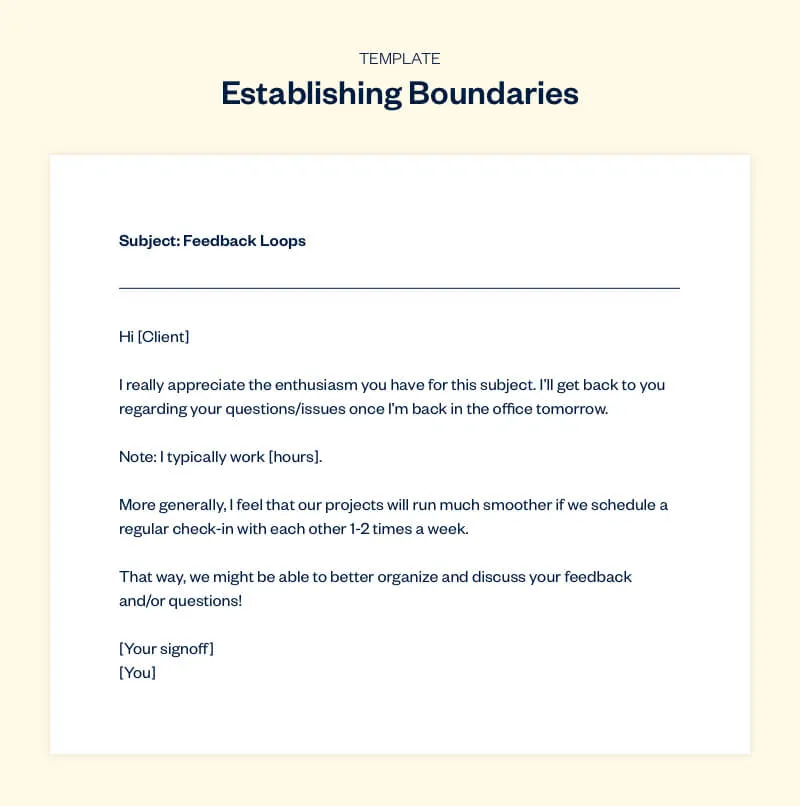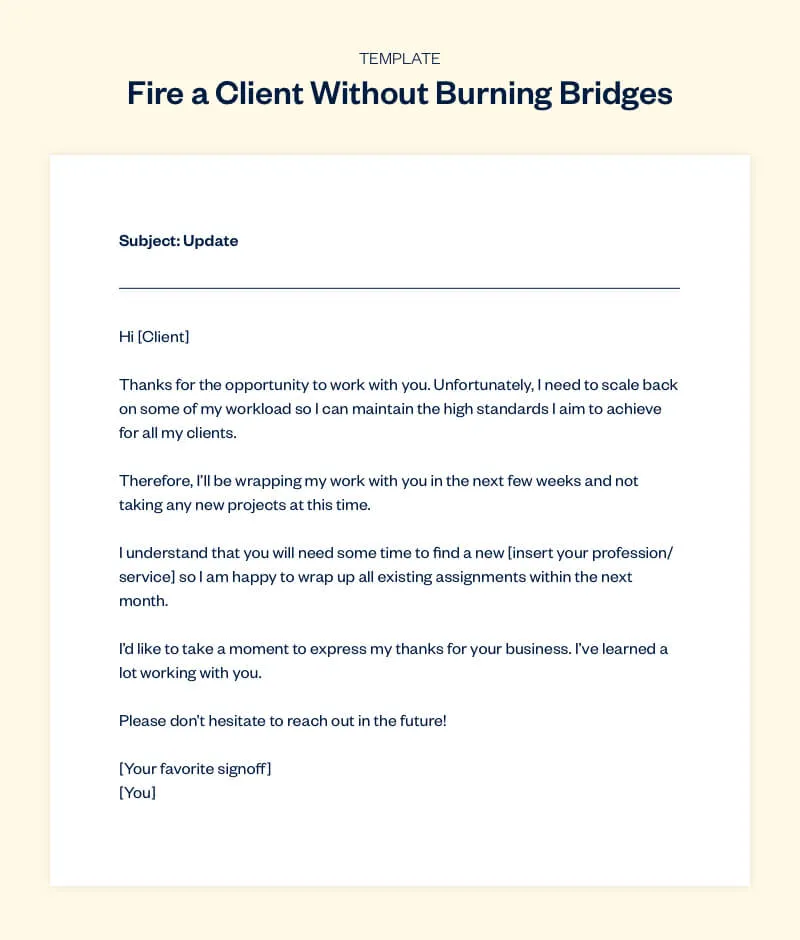Are bad clients causing havoc? Here's how to manage them better.

Good clients pay you on time and are a pleasure to work with. Bad clients, on the other hand, drain your energy, waste your time…they may even expect you to work for free.
If you’ve worked with bad clients in the past (or are stuck working with them now!), you may be wondering what to do. Can you transform a bad client into a good client? Is it better to fire them and create room in your schedule for better clients? And, moving forward, how can you manage your bad clients—or, better yet, how can spot and avoid bad clients before you start working with them?
Let’s jump into everything you need to know about working with and managing bad clients, including:
- The definition of a “bad” client
- The red flags you’ll want to look out for
- How to transform them into dream clients
- How to fire them when the relationship is beyond repair
Table of Contents
What Is a Bad Client?
Unpleasant clients appear in a variety of forms. Think clients who always pay late or bad-mouth other freelancers, and those who are poor communicators or expect special treatment.
The term “bad clients” can also include clients who aren’t a fit, whether because their budget doesn’t align with your rate, their project doesn’t align with your skills, or something just doesn’t feel right—even if you can’t put your finger on it.
How to Identify Bad Clients: 12 Red Flags
First things first. Before we jump into how to manage a bad client, let’s get on the same page about what, exactly, makes a particular client bad.
Here are 12 warning signs that you may have a difficult client relationship on your hands.
1. They’re Late Payers
No one is perfect—and sometimes, even the most ideal client on your roster will have an occasional missed payment.
But if late payment and past due invoices are par for the course, your company could be dealing with a bad client—and you’ve got some big decisions to make, including:
- Do you stop working with the client altogether?
- Do you withhold all future work until payment has been made?
- Do you charge late payment fees?
Bottom line? Clients who pay late can negatively impact your cash flow and make it harder to manage your company—and if you have a late payer on your hand, it’s important to set boundaries and make sure you get paid. (More on that in a bit.)
2. The Client Bad-Mouths Other Freelancers
Some clients may have been burned in the past—and, as such, have legitimate reasons for feeling a bit hesitant to form a working relationship with a new freelance service provider. And there’s nothing wrong with a client being honest about challenging experiences they’ve had with past businesses relationships.
What’s not okay, however, is a client trash-talking the freelancers they’ve worked with in the past—or the freelance industry as a whole. If they’re trash-talking their past freelancers, chances are, they’ll be trash-talking you in the future—and it’s just not a client relationship you want to get involved in.
3. Too Many Points of Contact
Have you ever heard the term “too many cooks in the kitchen?” Well, that saying applies to client relationships, too.
When there are too many contacts or decision-makers working on a project, goalposts change and confusion prevails. You end up spending more time clarifying details than actually doing any work—and chances are, you’ll have to change gears multiple times throughout the project.
It’s not uncommon to have multiple stakeholders involved with a project. But as a freelancer, you should have a single point person that collects information from those stakeholders, organizes it, and relays it back to you. That way, you don’t have multiple people telling you to do different (and often conflicting) things—and it’s easier (and less confusing!) to navigate the project.
4. They Nickel-and-Dime
Penny-pinching manifests in a variety of forms, from new clients saying they’re a startup that can’t pay well to those insisting on paying you less than your rate because they have other contractors working for less. Or, even worse, they expect you to work for free—and say it will be great “exposure” for your business.
If you find yourself in a scenario where you’re willing to work for free (e.g., volunteering your services for a charity), that’s fine. But in any other scenario, you want to work with clients who value you and your skills—and are willing to pay you accordingly.
5. They Provide Vague Direction
It’s not uncommon for clients to be unclear on what they want at the beginning of a project. And that’s fine; when you’re first kicking things off, you have time to connect with new clients, learn more about their challenges and problems, and get on the same page about how your business can provide a solution to those challenges and problems.
But if, after meeting multiple times, you can’t get your client to clearly outline their needs, project details, and scope of work, chances are, it’s going to be a frustrating working relationship—and you should seriously consider whether you want to move forward.
6. Their Word Is Easily Broken
Trust is an integral part of any working relationship—so be wary of clients who say one thing and then go back on their word. For example, if a client agrees to pay a deposit before you launch a new project—but then, when it’s time to kick things off, says they actually prefer to pay upon completion, consider it a red flag.
7. They’re Always Skeptical About the Skills You’ve Demonstrated
A new client or potential client is just being introduced to you and your business—so having to sell yourself in the early stages of a relationship is normal. But when clients continually expect you to “prove” your worth—despite a track record of previous successes—it can become frustrating and problematic.
For example, if a client continues to question your skills or abilities, you may begin to second-guess yourself or feel less competent than you are—which can have a negative impact on other client work and business relationships.
Bottom line? If a client doesn’t fully understand the value you bring to the table, that’s not a client you want to be working with.
8. They’re Unrealistic
Some of the most challenging clients to work with are the ones with completely unrealistic expectations. They’re the ones who expect you to be a magic bullet that solves all their problems—and delivers those solutions with minimal time and minimal budget.
Unless they adjust their expectations, there’s no satisfying these clients—and it’s typically best to walk away.
9. They Want Special Treatment
Some clients are more entitled than others—and another sign of a “bad” client? One that thinks they deserve special treatment.
“Special treatment” includes things like asking you for favorable payment terms or insisting you work beyond the scope for free—often classifying this work as only a “minor change.”
These are the kind of clients that will always ask for more—and unless you have very clear boundaries, they will try to take advantage of you at every turn.
10. They’re Bad Communicators
Communication is an essential part of any working relationship; great clients are great communicators—and bad clients? Well, they tend to struggle in the communication department.
The good news? Bad communicators often reveal themselves early on in a relationship—so if you notice any communication challenges in your initial conversations (e.g., taking days to respond to an email or consistently ignoring your questions), consider it a sign that you should probably walk away. Because if they can’t communicate effectively at the start, what makes you think their communication will improve once the project is in full swing?
11. They Place Unnecessary Demands on Your Time
Clients will value you if you’re willing to be flexible and push on important projects. However, if you’re always having to rearrange your schedule to accommodate client “emergencies,” odds are you’ll soon become resentful and burnt-out. This includes clients that constantly impose unreasonably tight deadlines, clients that expect you to work through the weekends, or clients who email you at 11 p.m. at night—and expect an immediate response.
These are the types of clients who expect you to be at their beck and call. All. The. Time. These clients will drain your energy and make you seriously stressed out. They’ll also monopolize your time, making it harder to devote your energy to better clients—which will ultimately make you lose money.
12. They’re Aggressive or Abusive
Aggression and abuse can manifest in overt ways, like yelling and swearing. But it can also be subtle and passive-aggressive. Either way, you’ll know it’s happening by how they make you feel, which is undervalued and disrespected.
There’s no question mark here—if you have a client that’s aggressive or abusive, don’t work with them. There are plenty of clients out there—and there’s no reason to work with ones who actively harm you.
How to Transform Bad Clients Into Dream Ones
Some bad clients (like an abusive client) are beyond saving; the best thing you can do for your business (and yourself!) is to walk away.
But in other situations, you may be able to work with your not-so-great client, transform them into a better client, and salvage the relationship.
This ability—to take a bad client and transform them into a manageable working relationship—will be a valuable skill as you grow your business. And in some cases, that extra effort might turn a “bad” client into one of your key anchor clients (with the income that goes along with it).
But if you want to transform your client relationship, you’ll need to muster up the courage to confront your client—and actually put in the work to create lasting change.
Might it be uncomfortable? Sure. But the reality is that it’s usually never as bad as you think it will be. In fact, most clients will begin to respect you more as you navigate challenging conversations and set clearer boundaries.
So how, exactly, do you do that?
Step 1: Identify the Red Flags
Before you can change a bad client into an ideal client, you need to identify what makes them “bad.” Refer back to the warning signs identified earlier to pinpoint what makes them so difficult to work with. Pinpointing and understanding the problem will help you identify a suitable strategy to fix it.
Step 2: Implement the Right Strategy to Transform Your Client
Every bad client is bad in their own way—and, as such, there’s no one-size-fits-all solution for dealing with them.
There are, however, some common themes. Here are some of the most common client issues you may face while running your service business—and, more importantly, how to deal with them.
1. Late Payment
If you’ve got a client that consistently pays their invoices late, there are a few ways to deal with them.
Sometimes, all the client needs is a simple reminder of when their payment is due. You can send these reminders at specific intervals, i.e., 5 days, 30 days, or even 60 days.
Consider using an email template to simplify the process. For example, for an invoice that’s 5 days overdue, you can say the following:
Template: Overdue Invoice
For more email templates like these, grab a copy of Awkward Conversations: A Guide for Small Business Owners.
Or, if you want to make the process even simpler, you can use a cloud accounting platform like FreshBooks, which automates late payment reminders—and removes the need to even have those conversations in the first place. With FreshBooks you can:
- Create incremental payment reminders when creating new invoices
- Track all payments and outstanding invoices
- Let clients pay you in 1 click directly from the payment reminder
Now, if you send out those late payment reminders and still aren’t getting paid? It may be time to incentivize your customers to pay on time with a late payment fee.
Research your state’s interest rate laws—and use that to determine how much you can charge in late fees. Once you have that number, update the existing invoice and send it to your client. Rinse and repeat until your client has paid.
And remember the following: Charging a late payment fee isn’t always the best idea. Sometimes a softer touch is needed, especially if the client is experiencing personal problems which are causing payment delays.
(It’s important to keep in mind that your clients are people, too. If you know your client’s payment delays are a result of a personal issue, like a health crisis, you may want to consider cutting them some slack—and skipping the late fees.)
Pro Tip: Request an upfront deposit from clients before you start working. Deposits weed out clients who resist paying and ensure clients become more invested in your project from the start. This, in turn, prevents scenarios where clients vanish halfway through the project.
2. Having Too Many Chiefs on a Project
Having too many chiefs causes confusion and can derail any project. Luckily, you can quickly nip this problem in the bud with a simple email.
If you’re struggling to write this email, then grab a handy template in our book Awkward Conversations: A Guide for Small Business Owners.
3. Not Respecting Your Time
As discussed, clients can disrespect your time in a variety of ways, but 2 of the most common include:
- Clients expecting you to be on call 24/7, often hounding you with emails late at night and sending follow-ups asking why you haven’t replied
- Clients always running on tight deadlines, which puts pressure on you having to produce work in ridiculously short time frames
Again, you can solve these 2 problems with a carefully crafted email. The 1st email template below helps you set clear boundaries, so you’re not at the client’s beck and call—and the 2nd improves workflow, so you’re not running on constant urgency.
Template: Establishing Boundaries
Template: Improving Workflow
4. Poor Communication
Clients that don’t know how to effectively communicate can cause real setbacks in any project. However, you can quickly get them to respond by sending them a gentle nudge via email.
If you want a template for this communication, you can find one in this eBook: Awkward Conversations: A Guide for Small Business Owners.
5. Out-of-Scope Requests
If you fail to manage out-of-scope requests by tackling those requests for free—instead of charging extra for them—your clients will learn that they can change the scope of the project (and create more work for you!) without paying any additional fees. It’s a slippery slope.
So, the sooner you adequately address these requests—and let clients know that you’ll need additional compensation for any additional work—the better. Here’s an email template that will help you do exactly that:
Template: A Way to Say, “You’ve Asked for More Than We Agreed Upon”
For an alternative approach to this communication, see our eBook Awkward Conversations: A Guide for Small Business Owners.
How to Fire Clients If the Relationship Is Beyond Repair
If you’ve tried all the above strategies and your client is still a nightmare to work with, then it’s probably time to walk away from the relationship.
After all, if you’re…
- Not getting paid for delivering quality work
- Working on projects that are no longer fun because there are too many cooks in the kitchen
- Running on constant urgency because your client is disorganized and doesn’t respect your time
- Unable to move steadily through a project because you cannot get timely feedback
- Always having to deal with clients who expect you to go the extra mile and deliver extra work for free
- Just generally finding the client unpleasant to work with
… then the client relationship isn’t doing you or your business any favors.
But before you pull the trigger and fire your client, just make sure you’re going about it the right way. That includes:
- Checking to see that you’re not breaking your contract.
- Finishing all client work that has been paid for.
- Giving the client advance notice that you’re ending the relationship so they can plan accordingly.
- Finishing any existing projects at a suitable milestone to ensure a smooth transition. You want to maintain professionalism and ensure you don’t leave them in a tough spot.
- Being polite, honest, and firm in your communication. Explain that, unfortunately, you can’t continue working with them but that you are willing to help tie up any loose ends.
Here is a template you can use to fire a client without burning any bridges:
Template: Fire a Client Without Burning Bridges
Notice how the email starts and ends on a positive note and remains professional and polite throughout—while still being honest and direct about the relationship ending? And that it reassures the client that existing assignments will be completed before the transition?
These small things are important; they ensure that your client continues to see your work and relationship in a positive light—which is key to maintaining your reputation.
Download all email templates here.
Start Working With and Attracting Better Clients
You’ve learned how to pinpoint bad clients by understanding the warning signs like late payment, poor communication, and not respecting your time—which can help you eliminate challenging clients in your business.
But if pretty much all of your clients fall under the “bad” umbrella, it may be time to look in the mirror. If you’re attracting challenging clients, the issue might be you; for example, maybe you’re not communicating effectively, setting clear boundaries, or establishing realistic expectations. In that scenario, you’ll need to figure out what, exactly, about your client management needs to change—and then change it so you can start attracting and working with better clients.
If you’ve determined that the problem isn’t with you, the issue could be that you’re not identifying red flags during the client onboarding process. If that’s the case, spend more time getting to know clients before you start working with them—and make sure to pay special attention to those warning signs and address them before you move forward with any projects.
If you just can’t seem to bring great clients into your business, then it’s probably time to revisit your process for finding and attracting clients—something you can learn more about in “5 Simple Steps to Getting Better Clients.”
With these strategies, you have everything you need to eliminate truly bad clients from your business, transform challenging clients into better ones, and start attracting the kind of people you want to work with into your business. So, what are you waiting for? Get out there and start working with the kind of clients you deserve—the good ones.
This post was updated in March 2022.

Written by Nick Darlington, Freelance Contributor
Posted on October 25, 2019

 Should You Charge Late Payment Fees on Invoices?
Should You Charge Late Payment Fees on Invoices? Roundup: Does it Ever Make Sense to Work For Free?
Roundup: Does it Ever Make Sense to Work For Free? Why Every Business Needs to Find and Land ‘Anchor’ Clients
Why Every Business Needs to Find and Land ‘Anchor’ Clients









